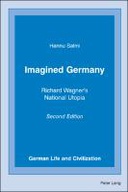Explore

Richard Wagner (1813–1883) has often been regarded as a symbol of "Germanness." Despite this view, few studies have been undertaken regarding his nationalistic thinking. Imagined Germany focuses on Wagner’s idea of Deutschtum, especially during the unification of Germany, 1864–1871. Salmi discusses how Wagner defined Germanness, what stereotypes, ideas, and sentiments he attached to it, and what kind of state could realize Wagner’s national ideals.
This book is included in DOAB.
Why read this book? Have your say.
You must be logged in to comment.
Rights Information
Are you the author or publisher of this work? If so, you can claim it as yours by registering as an Unglue.it rights holder.Downloads
This work has been downloaded 178 times via unglue.it ebook links.
- 178 - pdf (CC BY-NC-ND) at OAPEN Library.
Keywords
- Édition
- Germanness
- Germany
- History
- History: earliest times to present day
- History: specific events & topics
- Humanities
- Imagined
- Literary theory
- Literature & literary studies
- Literature: history & criticism
- Modern history to 20th century: c 1700 to c 1900
- Music
- NATIONAL
- nationalistic thinking
- Richard
- Salmi
- Second
- Social & cultural history
- The arts
- thema EDItEUR::3 Time period qualifiers::3M c 1500 onwards to present day
- thema EDItEUR::A The Arts::AV Music
- thema EDItEUR::D Biography, Literature and Literary studies::DS Literature: history and criticism::DSA Literary theory
- thema EDItEUR::N History and Archaeology
- thema EDItEUR::N History and Archaeology::NH History::NHT History: specific events and topics::NHTB Social and cultural history
- unification
- utopia
- Wagner's
Links
DOI: 10.3726/b16835Editions

